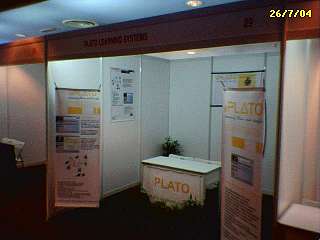
For 2 days I'm exhibiting ePLATO in Kuala Lumpur, Malaysia. The complex the conference cum exhibition is located also features a resort hotel, a night life spot and a huge shopping centre. Starbucks Grande Latte goes at USD 2.50 vs. USD 3.05 in Singapore. Our booth is not very spectacular, however on the first day we collected a number of excellent leads. It seems our regional focus and the mix of product and services looks attractive to our clients.
I can't comment on our hotel, since I don't care for hotels very much. My colleagues are pleased with location, rooms and service. Internet per day goes at 6.60 USD. I can use my room TV, my laptop through a 100MBit connection (local) or via WiFi at the convention centre.
Being curious about WIFI offerings I went and checked out the local providers: The bad news: WIFI for roaming users (read: using IPASS) is 6.5Cent a minute. The good news: if you have a colleague with a MAXIS phone subscription (s)he can send a SMS and get access for a whole day at 1.32 USD. This is quite reasonable. Gaining access for a week goes at 5.27 USD, a month sets you back 10.00 USD and a (prepaid) full year is 96.85 USD. This translates yo just 27cent a day. For this money I not even get 5 minutes access in Singapore. With a pricing like this WIFI usage is fun. An in deed every second table at Starbucks had a laptop on it.
Posted by
Stephan H Wissel on 26 July 2004
|
Comments (2)
|
categories: Software
When you grow up in Bavaria, as I did, it is very likely, that you end up with a Roman Catholic view of the world, at least initially. You have strong ideas what is right and what is wrong and who is calling the shots when it comes to the question who and what belongs to the dark side. The holy mother church makes sure, that you never forget, that the lord of the dark is the fallen first angel, who was disobedient.
The strongest reminder is that feeling of guilt. According to Catholic believe we are born already guilty. Over the years growing up, you start internalizing the moral authority, that was first represented by parents, teachers, priests and elders, into a nagging voice in the back of your head. Guilt is so entrenched in our culture and society, that e.g. breaking a rule not just has consequences, but you are foremost 'guilty as charged'. You have to remorse your deeds, so you acknowledge you guilt. Guilt has been used over centuries as a premier tool to manipulated people for whatever reason.
Enter Buddhism and the idea of Karma. The teaching is free of the concept of guilt (suspiciously the most authentic teachings of Jesus are free of the idea of guilt too). Karma simply says, that there are choices and consequences. You bear the consequence of your thoughts and deeds, you are the sole responsible person. Karma doesn't say anything about what has to or will happen to you. Karma to me is the essence of free will: It is your choice to increase or reduce suffering for you and the world.
On the first look it seems intriguing: no more moral authority, do what you want, you can't be guilty anymore. And an outcry of the law-and-order lobby: the world will fall into pieces.
On the second look: it's a really tough call: be your own moral authority, be your own source. Deep inside you always will know if you added to the suffering of the world with your actions and thoughts. No more excuses, no system to blame, no circumstances to explain away your responsibility.
What blows my mind is to make peace with my tendency to still categorize things as right or wrong. The difference between the two concepts is subtle: right and wrong can be totally random and easily be manipulated and twisted. The increase in suffering as a result of your actions can be seen, heard, felt and sensed, given you have cultivated your senses.
Posted by
Stephan H Wissel on 10 July 2004
|
Comments (3)
|
categories: After hours
